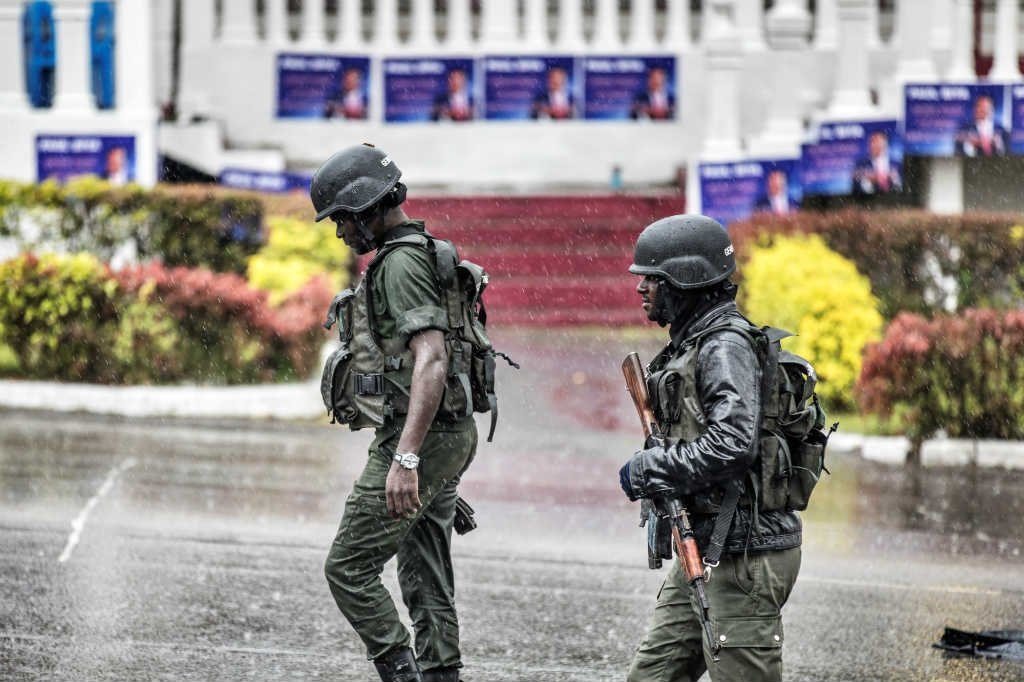

Yaound – Cameroon’s army on Monday denied opposition
charges that it had massacred villagers in a troubled English-speaking region,
blaming instead an “unfortunate accident” caused by an explosion of
fuel during a firefight.
Up to 22 civilians, 14 of them children, died in
the incident on Friday, according to the United Nations – deaths which
opposition parties blamed on members of the armed forces.
But army spokesperson Colonel Cyrille Atonfack
Guemo described the allegations as “duplicitous”.
An army investigation, he said, found that the
deaths happened after fuel was set ablaze during a gunfight with anglophone
separatists.
Five civilians – a woman and four children – died,
and “seven terrorists” were “neutralised”, Atonfack told
AFP in Libreville by phone.
The deaths occurred in the village of Ntumbo in
Cameroon’s Northwest Region – one of two English-speaking regions that have
been grappling with separatist violence since October 2017.
More than 3 000 people have died and at least 700 000
have fled their homes.
“It was quite simply an unfortunate accident,
the collateral result of security operations in the region,” Atonfack said
in a statement.
He said four soldiers and two gendarmes had been
carrying out night-time reconnaissance on foot near a home that had been “transformed into a fortress” with a stockpile of weapons.
They came under heavy fire, and exchanges caused “several containers of fuel to explode, followed by a blaze which spread
[to] several neighbouring homes”, Atonfack said.
Gunmen
On Sunday, James Nunan, a local official with UN
humanitarian coordination agency OCHA, told AFP that “armed men” had
killed as many as 22 civilians, including a pregnant woman and 14 young
children.
Eleven of the children were girls, said Nunan, head
of OCHA’s office for the Northwest and Southwest regions.
Aid workers contacted by AFP said witnesses had
told them that between 40 and 50 armed men – some wearing army uniform and some
wearing masks – entered Ngarbuh, a district of the village, before shooting
inhabitants dead and burning them.
“They fired on people and burned victims – their
bodies are in a terrible state,” said an aid worker, speaking on condition
of anonymity.
“People phoned us to say that soldiers had
come and smashed down doors, opened fire on people and set homes on fire,”
Ntumbo resident Louis Panlanjo, a member of a local association, told AFP.
“People took shelter in the centre of the
village. There was about 800 of them.”
A resident who wanted to remain anonymous told AFP
by phone that 35 bodies had been recovered and the army was to blame.
The Movement for the Rebirth of Cameroon (MRC), one
of the two main opposition parties, blamed “these crimes” mainly on
the regime and the head of the security forces.
A key figure in the separatist movement, lawyer
Felix Agbor Mballa, in a Facebook post also accused “state defence
forces” of carrying out the killings.
The army had previously denied any involvement in
the deaths.
Restive region
English-speakers account for nearly a fifth of
Cameroon’s population of 24 million, who are majority French-speaking.
Years of grievances at perceived discrimination
snowballed into a declaration of independence in October 2017 and a government
crackdown.
The declaration has not been recognised
internationally although the government has lately decentralised some of its
powers.
The UN refugee agency said on Thursday that almost
8 000 people had fled into Nigeria from Cameroon in the previous two weeks to
escape the fighting, bringing the number of refugees to almost 60 000.
Once considered a haven of stability in central
Africa, Cameroon has for the last seven years seen the jihadist group Boko
Haram kill soldiers and civilians in the north.
In the latest attack, three people were killed on
Saturday when Boko Haram militants set fire to around 100 homes, looted shops
and stole grain, security officials said.
Meanwhile, the much-delayed trial was due to begin
on Monday of seven soldiers accused of killing two women and their babies in
2015. However, the trial in the capital Yaounde had not started by Monday
evening.
The murders, which came to light through a video on
the internet, were initially dismissed as “fake news” by the
government, which later investigated the incident and arrested seven suspects.
